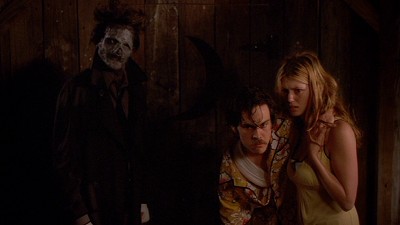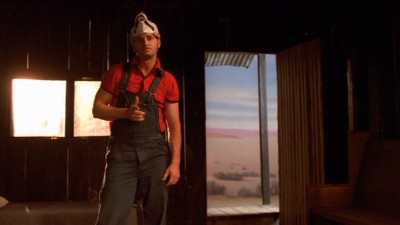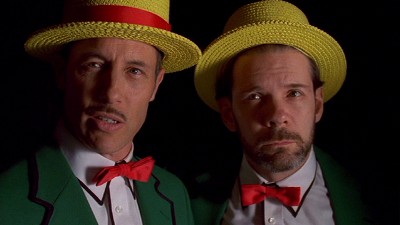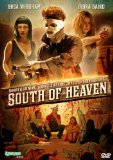| Reviews & Columns |
|
Reviews DVD TV on DVD Blu-ray 4K UHD International DVDs In Theaters Reviews by Studio Video Games Features Collector Series DVDs Easter Egg Database Interviews DVD Talk Radio Feature Articles Columns Anime Talk DVD Savant Horror DVDs The M.O.D. Squad Art House HD Talk Silent DVD
|
DVD Talk Forum |
|
|
| Resources |
|
DVD Price Search Customer Service #'s RCE Info Links |
|
Columns
|
|
|
South of Heaven
 South of Heaven is a film that really threw me for a loop. It's visually arresting, well-performed, stylishly directed, and often bizarrely dispairing, summoning in the viewer the same sense of hopelessness that the characters are feeling. It's a wonderful, incredibly original piece of filmmaking that never does what the viewer expects, all with the effect of making the viewer feel like shit.
South of Heaven is a film that really threw me for a loop. It's visually arresting, well-performed, stylishly directed, and often bizarrely dispairing, summoning in the viewer the same sense of hopelessness that the characters are feeling. It's a wonderful, incredibly original piece of filmmaking that never does what the viewer expects, all with the effect of making the viewer feel like shit.The plot revolves around two brothers, named Roy Coop (Adam Nee) and Dale Coop (Aaron Nee). When the movie begins, we're with Roy, who strides into his brother's curiously empty apartment, fresh off a stint in the Navy. His brother has been sending him a novel in letter form over the course of his tour of duty, and now that Roy is back, he's going to shape it into the Great American Novel, and the two will become rich. Before that can happen, sadly, two hoods dressed as carnies (Jon Gries and Thomas Jay Ryan) break into said apartment and demand to know the whereabouts of a missing girl. Roy has no idea about the girl, but when one tells two hoods he's the brother of the guy they're meant to find in an apartment, that kind of answer doesn't really score you any traction.
Meanwhile, across the painted desert backdrop, Dale is having his own problems. Through methods left unexplained, he's been suckered into a kidnapping plot by a truly dangerous criminal named Mad Dog Mantee (Shea Whigham), who is a volatile combination of angry and sort of dim. Mad Dog has devised a blackmail scheme that involves sending fingers to a notorious mob boss, and things have gone awry in a way that only happens when you have someone like Mad Dog running the show. While Mad Dog rapes or murders anyone who comes in contact with them, Dale stares off into space, seemingly so timid as to distract himself from even daydreaming of escape.
Writer/director J.L. Vara has a way with words; he crafts speeches for his characters that are actually witty and interesting, unlike so many filmmakers raised on Tarantino. At the same time, he directs the film with the tone of a film noir-slash-western, and the look of a bizarre fever dream someone had on a 1940s backlot. Some of the most creative and inventive Hollywood blockbusters of the last few years don't blend as many disparate elements as Vara combines here, without any of the seams showing, bounding from comedy to dark, violent drama and rising to sweet romance over just a few consecutive scenes, all while Vara employs rear projection, animation, and bizarre costume and production design to bring intentionally cheap sets to vivid life. It's pretty hit-or-miss when it comes to a low-budget movie looking anything less than naturalistic at best and cheap at worst, but South of Heaven uses its limitations in its favor, combining them into the intended look of the movie.
 That said -- and this is a complaint that will not bother some, so make of it what you will -- Vara has it in for his characters. The film has plenty of humor, but there's barely a single moment in the whole film when something pretty terrible isn't happening to Roy or Dale. The impressive control of tone that Vara reveals in lighter sequences is just as strong when these awful things are occurring, and when that combines with the level of charisma and likability that both Nees naturally project, the movie sort of inadvertently becomes depressing. I have seen plenty of bad things happen to good film characters, even to an extreme, and yet something about watching these guys take beating after beating just started to wear me out.
That said -- and this is a complaint that will not bother some, so make of it what you will -- Vara has it in for his characters. The film has plenty of humor, but there's barely a single moment in the whole film when something pretty terrible isn't happening to Roy or Dale. The impressive control of tone that Vara reveals in lighter sequences is just as strong when these awful things are occurring, and when that combines with the level of charisma and likability that both Nees naturally project, the movie sort of inadvertently becomes depressing. I have seen plenty of bad things happen to good film characters, even to an extreme, and yet something about watching these guys take beating after beating just started to wear me out.
At the heart of this issue is Whigham's Mad Dog, one of those kinds of people who tears a wound in a person and then lays the blame on them. The character has a twisted code of ethics that means he's just gotta relentlessly whip Dale's back to shreds when Dale tries to let one of their prisoners go, because Dale's got to learn a lesson one of these days. Whigham's performance is faultless, a hilariously deadpan tour-de-force, but his character's stubbornness (intentionally) makes the blood boil, right up to the very end. Not even the presence of Diora Baird is enough to lighten the mood entirely. South of Heaven is a genuinely unique experience: dazzling, inventive, and slightly agonizing.
The DVD
It's hard to package a film like South of Heaven, and Synapse's art is about as effective (or not-so-effective) as one can expect. The art shows several elements from the film, like Nobody and a scene of Dale and Mad Dog at a massacre, but it's hard to look at it after viewing the movie and feel like the art sums it up at all. Oh well. The disc comes in a standard case, and there is no insert.
The Video and Audio
South of Heaven appears to have been shot on rich, grainy, 35mm, and that grain is clearly visible on this DVD. Although standard definition resolves the grain on the fine line between pleasant and "noisy," this is a strong transfer that effectively handles the movie's bright, colorful style. Some of the details are a little soft, and there was a single moment during the film's animated intro with heavy aliasing, but 99% of the transfer looks accurate and vivid, and there's even one or two extreme closeups that are really impressive.
Audio is Dolby Digital 5.1, and it's as bold as the movie's look. There's a fair amount of surround activity during some of the movie's violent scenes, and the movie's score is particularly effective, leaping out of the speakers with energy to spare. The film is free of the "cheap library" sound that plagues so many low-budget releases as well. Dolby Digital 2.0 audio is also available. The only complaint -- and a somewhat major one, thanks to Wigham's frequent growling -- is the complete lack of closed captioning or subtitles on the disc.
The Extras
On the "Special Features" menu, there are three extras, all of which are short films by director J.L. Vara ("Miserable Orphan" - 37:52; "Azole Dkmuntch" - 27:58; and "A Boy and His Fetus" - 14:50). Boy, if you thought the feature was weird, these shorts are certainly something else. To be honest, I found all three of them to be kind of aggressively off-putting; they in the "bad David Lynch" vein or something like that. Still, you can see how some of the techniques in these shorts (along with actors Aaron and Adam Nee) made their way into the feature film,  so I suppose that's decent justification for them to be included.
so I suppose that's decent justification for them to be included.
But wait, there's more! The "Audio Setup" menu houses not one, but three audio commentaries, by actors Aaron and Adam Nee, Jon Gries, and Shea Whigham; by online film critics Scott E. Weinberg (FearNET), Devin Faraci (Badass Digest), and Todd Brown (Twitch); and by writer/director J.L. Vara, cinematographer Darren Genet, and producers Brian Udovich and Jason Polstein. The first commentary is primarily driven by Gries, who clearly loves the movie; he does a good job of motivating the others to talk. Whigham also has plenty to contribute, despite seeming a bit reserved at the beginning. The gang talks about their individual shooting experiences, what they brought to the characters, what impressed them about Vara, and what they appreciate about each others' performances. The track with Vara is more about the filmmaking, from the stylistic choices, technical decisions, and other minutia about the production. Finally, the critic's commentary covers a range of topics: references to film styles or genres, shooting on 35mm, the catch-22 of championing independent films only to have viewers complain about overhype, and the value of making low-budget films for adults. It's a good listen, although there are brief slow patches, and, as Faraci mentions, it may be more interesting for people who are familiar with the critics themselves than fans of the movie. The track is also a bit of a time capsule, clearly recorded near the end of 2008.
Conclusion
I had trouble enjoying South of Heaven, not because it's a bad movie, but because it heaps such misery on its likable, vibrant characters. Thgat said, whether or not the viewer finds that aspect as agonizing as I did is irrelevant to a recommendation -- this is a film that leaps off the screen, in sharp contrast to the cookie-cutter kinds of movies currently occupying the local multiplex.
Please check out my other DVDTalk DVD, Blu-ray and theatrical reviews and/or follow me on Twitter.
|
| Popular Reviews |
| Sponsored Links |
|
|
| Sponsored Links |
|
|
| Release List | Reviews | Shop | Newsletter | Forum | DVD Giveaways | Blu-Ray | Advertise |
|
Copyright 2024 DVDTalk.com All Rights Reserved. Legal Info, Privacy Policy, Terms of Use,
Manage Preferences,
Your Privacy Choices | |||||||













